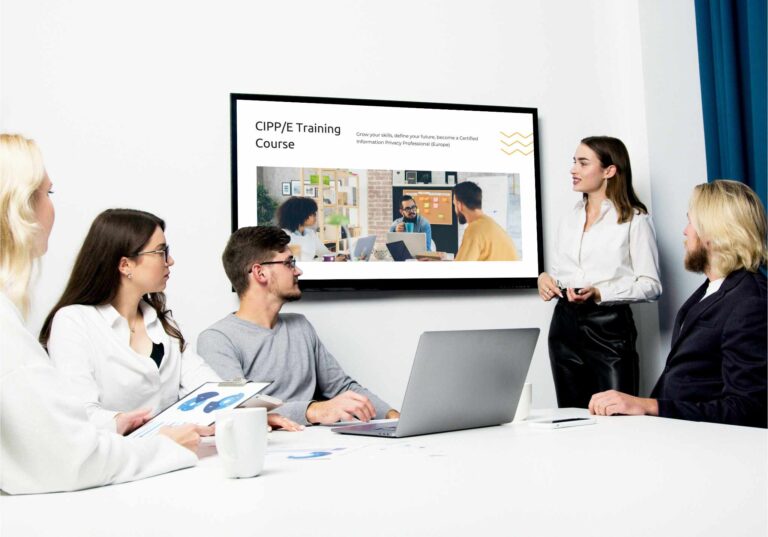Want to write questions for the IAPP privacy exams?
Writing for IAPP Certification Exams: Credentialing the Next Generation of Privacy Professionals is the title of a recent video posted by the IAPP on LinkedIn. The session was moderated by Bridget Morang, (Senior Certification Operations Manager) and the speakers were Stacie Cocola (Certification Exam Manager) and Susan Tierney (Senior Certification Program Developer). The IAPP always produces really informative videos and this session was no different. The panel broke down how the IAPP certification exams are created and how you too can become a question writer. You can watch the full video here (30 mins) or read our quick summary below.
The panel started by talking about who writes the exam questions. It’s privacy professionals from two groups; Exam development board members and individual contributors who volunteer to lend their expertise and experience. These contributors are not part of a formal board. They must be certified (and in good standing) in the designation they are writing for.
Becoming an IAPP Certification Exam question writer
If you’d like to volunteer, you can do so on the IAPP website volunteer page. Search for IAPP certification exams item writer
The IAPP hosts virtual and in-person question writing workshops through the year. There will be an In-person workshop this October at the Privacy. Security. Risk conference specifically for CIPT exam questions. If you would like to participate, keep an eye on the Privacy. Security. Risk 2022 conference website for registration details
The discussion was also a reminder that for the purposes of ANSI/ISO accreditation, the IAPP training and exam creation departments must be totally separate. Those providing training courses or books cannot be involved in creating the exam questions. The body of knowledge is the document which tells questions writers what they can and can’t put on the exam. The training department also uses this document to inform the creation of training products
What makes a good exam question?
Submitted questions go through a number of steps that assure it’s a quality question. First they go to the exam managers for review then to the exam development board to revise them, if necessary. When the question gets onto an exam it’s field tested first so it doesn’t count towards a candidate’s score. That way the exam board can gather data on it without affecting a candidates result.
Twice a year a psychometrician (statistician who specialises in looking at test-taker data) looks at test data. They specifically look at two things. How difficult is the question (how many people are getting it right/wrong) and item discrimination (how does this question differentiate between those who know the content and those who don’t). This helps the team decide what questions should be on the exam.
Benefits for volunteers
So what are the benefits for question writing volunteers? You will get to meet and network with lots of other privacy professionals and experts during the question creation process. You are giving back to the privacy community and you can also earn CPEs (max. 10 per two year term). In addition, if you really enjoy the work it can be a great stepping stone to becoming an exam development board member
There was a Q&A section in the video about half way through. The speakers went into more detail on the process of being a question writer; the time commitment, the training, non-disclosure agreements etc. They also discussed the annual exam updates and how questions are added/removed annually based on examining test-taker data and consultation with the exam board. The speakers mentioned that they have around 30 writers across all designations. It is harder to recruit for some than others and they are particularly calling for CIPP/C and CIPT writers!
The Body of Knowledge
There was much discussion about the Body of Knowledge and what it is. It is a document that basically lists all the content that is fair game to be assessed on the exam. It’s available for free on the IAPP website and every designation has it’s own Body of Knowledge. Anything that is not on the Body of Knowledge will not be examined, that’s part of the ANSI/ISO accreditation criteria. That’s how they keep the test fair for everybody, whether they are taking IAPP training or studying on their own. Everyone will be tested on the same content. The Body of Knowledge documents are also reviewed every year, although not necessarily changed every year.
The next question was, what should people new to the industry do in terms of certifications and training? They said it very much depends on what the candidates role is in privacy and where in the world they are located. Whether they work with companies based in the country where they work or in a different jurisdiction also has an impact. The speakers recommended candidates look at the free resources and webinars on the IAPP website and also to connect with people who have some certifications already. People are also welcome to reach out to customer service reps at IAPP.
IAPP Certification Exams annual update 2022
The IAPP exams will have their annual update on October 3rd 2022. New Body of Knowledge documents are already available to download on the IAPP website. Join our study groups on Facebook to chat to fellow exam candidates about these changes and share study tips






